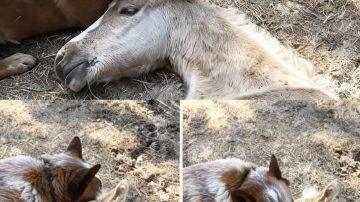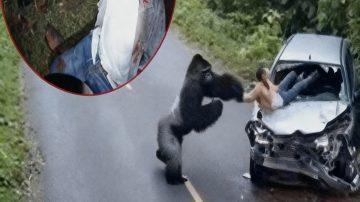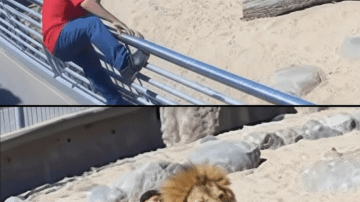The hushed anticipation at the metropolitan zoo had been building for 22 long months, a period of watchful waiting that tested the patience of even the most seasoned zookeepers. Rosie, a magnificent 25-year-old African elephant and a revered matriarch within the herd, was finally nearing the end of her remarkably extended pregnancy. What they didn’t know was the full extent of the drama that was about to unfold. On a cool, quiet morning, just as dawn was beginning to paint the sky, the air in the elephant enclosure crackled with a new kind of energy. At precisely 5:45 a.m., a momentous event occurred: Rosie gave birth to a healthy, albeit surprisingly small, calf. The tiny newcomer, later named Ivy, weighed a delicate 222 pounds – on the lower end of expectations for an elephant calf, sparking immediate, though quiet, concern among the veterinary team. As Ivy, all gangly legs and tentative movements, wobbled to her feet, a palpable wave of relief and unbridled joy swept through the dedicated staff who had overseen every moment of Rosie’s journey. Rosie, with the wisdom of her years, gently nudged and guided her newborn, her trunk a comforting presence as Ivy began the monumental task of finding her footing in a vast new world. This birth, however, was merely the beginning of an extraordinary tale, a story far richer in unexpected turns than anyone could have predicted.

The initial relief quickly gave way to a new set of challenges. Ivy, despite her mother’s attentive care, struggled with her initial feeds. The veterinary team discovered a minor anatomical anomaly that made latching difficult, a complication they had never encountered in their breeding program before. Days turned into sleepless nights for the staff, who worked tirelessly, using innovative techniques and specialized feeding tubes to ensure Ivy received the vital colostrum and milk she desperately needed. Just as they thought they had turned a corner, a sudden, unexplained drop in Ivy’s energy levels sent them into another frantic scramble, fearing the worst.

Through meticulous observation and advanced diagnostics, they uncovered a rare, mild infection that, while not immediately life-threatening, could have severe long-term consequences if left untreated. The unexpected diagnosis necessitated a rapid shift in their care protocol, introducing a delicate balance of medication and supportive therapies. The tension was palpable; every flicker of Ivy’s tiny trunk, every tentative step, was monitored with bated breath, the entire zoo community holding its collective breath, praying for her recovery.

Yet, against all odds, Ivy began to rally. Her resilient spirit, coupled with Rosie’s unwavering maternal instincts and the tireless dedication of the zoo team, proved a powerful combination. Slowly but surely, her appetite returned, her energy levels soared, and the infection receded. Her journey, marked by these unforeseen twists and turns, transformed her birth from a simple joyful event into a profound testament to the power of perseverance and specialized care.

Today, Ivy is thriving, a vibrant, playful calf whose days are filled with discovery. She mimics her mother’s every move, from flapping her ears in playful displays to mastering the art of using her trunk to grasp hay. Her initial struggles, once a source of deep concern, now serve as a powerful narrative, underscoring the critical importance of robust breeding programs and the relentless pursuit of knowledge in conservation efforts.






